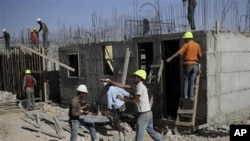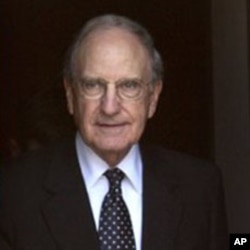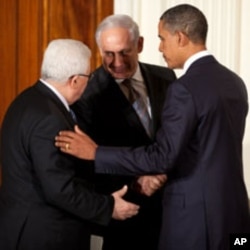In 2010, there were some breakthroughs in efforts to bring an end to the Israeli-Palestinian conflict. But the year ended in frustration, with both sides as far apart as ever on the key issues of borders, Jewish settlements in the Israeli-occupied West Bank and the status of Jerusalem.
At the end of each year, Imran Akram, a Palestinian farmer near the West Bank city of Nablus, normally picks his olive trees. This year, there's no harvest.
He's trying to save his trees after what he says was an attack by residents of a nearby Jewish settlement. They cut his trees because - he says - they want to drive him from his land.
For him, 2010 began with the hope that U.S.-brokered peace talks would end the Israeli occupation, but hope faded.
"Before the talks, I had a 40 or 50 percent hope that negotiations would succeed and we would reach peace. Unfortunately, all these negotiations are a failure," said Akram.
In May, the Arab League endorsed indirect talks. "What we have from the Americans today satisfied our requests and demands and we hope we will watch the deeds and not the words," said Palestinian Chief negotiator Saeb Erekat.
The Palestinians said they would agree to direct talks only if Israel halted settlement building on the occupied West Bank. The U.S. applied pressure, and Israel declared a 10-month partial freeze on Jewish settlement as a sign of good faith. Direct talks began in Washington in early September. "By being here today, you each have taken an important step toward freeing your peoples from the shackles of a history we cannot change and moving toward a future of peace and dignity that only you can create," said U.S. Secretary of State Hillary Clinton.
But the hope of creating peace was short-lived. Within weeks, Israel let its self-imposed construction freeze expire. Construction resumed. The Palestinians walked out. U.S. envoy George Mitchell returned to the region.
"We are determined to continue and we are continuing our efforts to find common ground between the parties to enable the direct negotiations to continue," he said.
The United States offered Israel jet fighters and diplomatic guarantees in return for a construction freeze so talks would resume. Israel hesitated and in early December the U.S. pulled the offer. Many Israelis want their government to refrain from further talks with the Palestinians.
"From the beginning I did not have high hopes and now I do not have high hopes because the Palestinians do not have the courage to make decisions," said an Israeli man. "We made difficult decisions, we withdrew from the Sinai, we withdraw from Gaza and what did we get?"
Many Israelis feel that their withdrawal from Gaza in 2005 brought rocket attacks from the enclave. It was taken over by Hamas militants after Israel's pullout.
Many also believe that earlier withdrawals from Arab territories did not win Israel new friends, nor greater security.
For Palestinians like Imran Akram, frustration only builds as the promise of an end to the Israeli occupation and the creation of a Palestinian state are nowhere on the horizon. He says U.S. mediators, Israel, and Palestinian leaders must find a solution -- soon.
"I am asking all the states to allow us to live in peace and let them live in peace," said the farmer Imran Akram. "When the Jewish settlers came and cut all my trees, I was just working. I'm just farming. All my life is in these trees. When they cut the trees, what's left for me?"
As 2010 ends, the peace process is stalled with little hope that 2011 will bring an end to the conflict.



